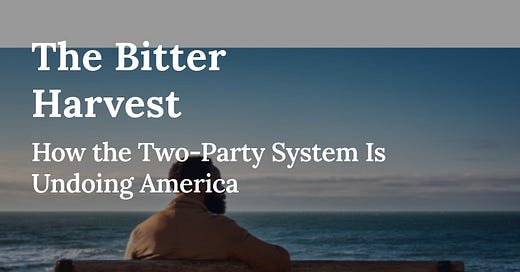For generations, the American two-party system was lauded as a pillar of stability, a pragmatic engine ensuring clear choices and manageable governance. Yet, a disquieting truth is now undeniable: the very framework we once celebrated has become the root of our current malaise, transforming what were once genuine societal gains into little more than superficial window dressing. America, by nearly every meaningful metric beyond raw economic figures, is not truly progressing; it is stagnating, if not regressing, under the weight of an adversarial, calcified political duopoly.
The most glaring symptom of this systemic failure is the unprecedented polarization that has fractured our nation. What began as ideological differences between Democrats and Republicans has metastasized into an "us vs. them" tribalism that permeates every facet of life. It’s no longer about policy debates; it’s about existential warfare. This isn't just felt in Washington's legislative gridlock, where critical issues languish year after year. It’s felt at our dinner tables, where families are torn apart by political divides. It’s seen in our communities, where neighbors view each other with suspicion based on yard signs. This deep-seated animosity, far from fostering robust debate, stifles it, making compromise a betrayal and consensus a sign of weakness.
This constant state of political warfare has direct and devastating consequences for the average citizen. The promise of clear choices has devolved into a coercive dilemma: pick your poison, for there is no genuine third option. For millions of Americans whose views don't perfectly align with either the Democratic or Republican platform, the feeling of political homelessness is profound. They are forced to vote for the "lesser of two evils," fueling cynicism and deep-seated disillusionment. Voter apathy grows not from disinterest, but from despair that their vote will genuinely alter the trajectory of a system designed to perpetuate its own internal conflict.
Furthermore, this entrenched two-party system has fostered an environment where genuine societal progress is sacrificed at the altar of partisan victory. Consider the grand challenges of our time: crumbling infrastructure, escalating healthcare costs, persistent economic inequality, the existential threat of climate change. While these issues demand innovative, long-term solutions, our political system delivers instead a cycle of reactive, short-term fixes, if anything at all. One administration painstakingly crafts a policy, only for the next, driven by the imperative to undo anything associated with the opposition, to dismantle it. This constant reversal of course prevents the sustained effort needed for meaningful advancement, turning every "gain" into a precarious, temporary victory. The "progress" we celebrate often appears superficial precisely because it lacks the deep, bipartisan foundation required for resilience and lasting impact.
The pervasive erosion of trust in institutions, another bitter fruit of this system, is equally corrosive. When political discourse is dominated by accusations and counter-accusations, when compromise is framed as weakness, citizens lose faith not just in politicians, but in the very mechanisms of governance, the electoral process, and even objective truth. This fragmented information environment, fueled by partisan media, traps individuals in echo chambers, making shared understanding and collective action increasingly difficult.
The two-party system, once seen as America's strength, has become its Achilles' heel. It has fostered division over unity, stagnation over genuine advancement, and disillusionment over hope. The current condition of America—its deep social fissures, its political paralysis, and its frustrating inability to address fundamental challenges—is not an anomaly. It is the natural, inevitable harvest of a system that has become too rigid, too adversarial, and too self-serving to truly serve the people it purports to represent. Unless we confront and fundamentally reimagine this foundational structure, the superficial gains we cling to will continue to mask a deeper, more profound decline.


